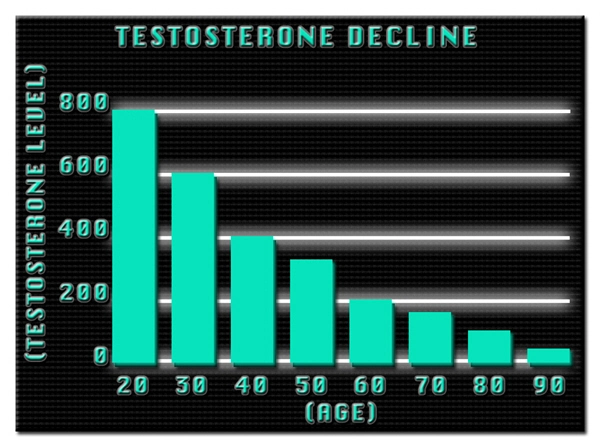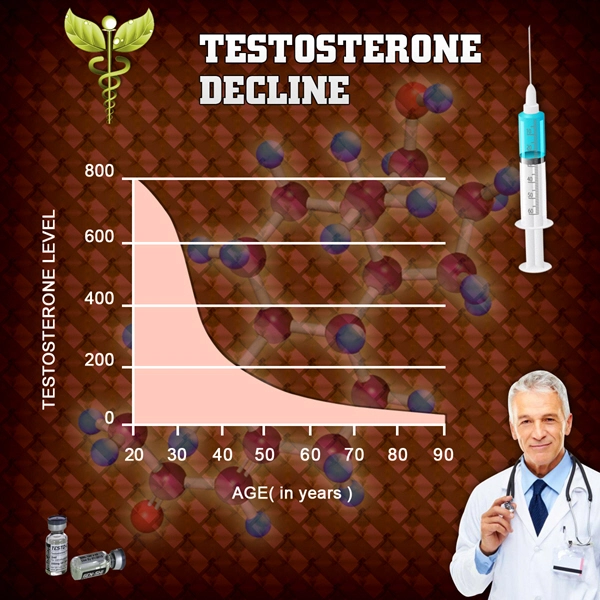Introduction
Delatestryl, a testosterone enanthate injection manufactured by Endo Pharmaceuticals, is commonly prescribed to treat conditions associated with testosterone deficiency in men. As the prevalence of hypogonadism rises among American males, understanding the broader implications of testosterone replacement therapy (TRT) on health outcomes becomes increasingly critical. This article delves into the effects of Delatestryl on lipid profiles and cardiovascular risk, providing essential insights for both healthcare providers and patients.
Understanding Delatestryl and Its Mechanism
Delatestryl is an injectable form of testosterone enanthate, designed to supplement or replace the body's natural testosterone production. It is administered intramuscularly, typically on a biweekly basis, to maintain stable serum testosterone levels. The primary goal of TRT is to alleviate symptoms of hypogonadism, such as decreased libido, fatigue, and muscle loss. However, the impact of long-term testosterone supplementation on cardiovascular health remains a topic of ongoing research and debate.
Impact on Lipid Profiles
One of the key areas of concern with TRT is its effect on lipid metabolism. Studies have shown that testosterone can influence lipid profiles, potentially affecting cardiovascular risk. Delatestryl has been observed to decrease levels of high-density lipoprotein (HDL) cholesterol, often referred to as "good" cholesterol, which plays a crucial role in removing harmful cholesterol from the bloodstream. Conversely, some research indicates that testosterone may reduce levels of low-density lipoprotein (LDL) cholesterol, known as "bad" cholesterol, although findings are inconsistent.
A comprehensive review of clinical trials suggests that the net effect of Delatestryl on lipid profiles may vary among individuals. Factors such as baseline lipid levels, dosage, and duration of therapy can influence outcomes. Therefore, regular monitoring of lipid profiles is recommended for men undergoing TRT to mitigate potential cardiovascular risks.
Cardiovascular Risk and Delatestryl
The relationship between testosterone therapy and cardiovascular health is complex and multifaceted. While some studies suggest that TRT may increase the risk of cardiovascular events, such as myocardial infarction and stroke, others report no significant association or even potential benefits. The variability in findings underscores the need for personalized risk assessment and management.
Delatestryl's impact on cardiovascular risk may be mediated through its effects on blood pressure, inflammation, and vascular function. Some research indicates that testosterone can improve endothelial function, which is essential for maintaining healthy blood vessels. However, the potential for increased hematocrit levels, a known side effect of TRT, may contribute to an elevated risk of thrombosis.
Clinical Recommendations and Monitoring
Given the potential cardiovascular implications of Delatestryl, healthcare providers should adopt a cautious approach when prescribing TRT. Baseline cardiovascular risk assessment, including evaluation of lipid profiles, blood pressure, and hematocrit levels, is essential before initiating therapy. Regular follow-up and monitoring are crucial to detect any adverse changes and adjust treatment as necessary.
Patients should be educated about the potential risks and benefits of Delatestryl and encouraged to adopt a heart-healthy lifestyle, including a balanced diet, regular exercise, and smoking cessation. Collaboration between endocrinologists and cardiologists may be beneficial in managing patients with pre-existing cardiovascular conditions.
Conclusion
Delatestryl, while effective in treating testosterone deficiency, presents a nuanced profile regarding its impact on lipid metabolism and cardiovascular risk. American males considering or currently undergoing TRT should be aware of these potential effects and work closely with their healthcare providers to monitor and manage their cardiovascular health. As research continues to evolve, personalized approaches to TRT will be key in optimizing outcomes and minimizing risks for patients.

- Delatestryl: A Breakthrough in Androgen Deficiency Treatment for American Males [Last Updated On: March 16th, 2025] [Originally Added On: March 16th, 2025]
- Delatestryl: Revolutionizing Testosterone Therapy for American Men's Vitality [Last Updated On: March 17th, 2025] [Originally Added On: March 17th, 2025]
- Delatestryl: Safe, Effective Testosterone Treatment for American Males with Hypogonadism [Last Updated On: March 17th, 2025] [Originally Added On: March 17th, 2025]
- Delatestryl: Revolutionizing Hormone Therapy for American Males with Testosterone Deficiency [Last Updated On: March 18th, 2025] [Originally Added On: March 18th, 2025]
- Delatestryl: Enhancing Sexual Health in American Men with Hypogonadism [Last Updated On: March 19th, 2025] [Originally Added On: March 19th, 2025]
- Delatestryl: Revolutionizing Testosterone Therapy for American Men's Health [Last Updated On: March 20th, 2025] [Originally Added On: March 20th, 2025]
- Delatestryl: Enhancing Bone Density and Quality of Life in American Males [Last Updated On: March 21st, 2025] [Originally Added On: March 21st, 2025]
- Delatestryl: Advancing Men's Health with Effective Testosterone Replacement Therapy [Last Updated On: March 21st, 2025] [Originally Added On: March 21st, 2025]
- Delatestryl: A New Hope for American Men with Hypogonadism [Last Updated On: March 21st, 2025] [Originally Added On: March 21st, 2025]
- Delatestryl: Enhancing Weight Management in American Males through Testosterone Therapy [Last Updated On: March 21st, 2025] [Originally Added On: March 21st, 2025]
- Delatestryl: Endo's Injectable Testosterone for Managing Low T Symptoms Effectively [Last Updated On: March 21st, 2025] [Originally Added On: March 21st, 2025]
- Delatestryl: Enhancing Performance and Health for American Male Athletes [Last Updated On: March 22nd, 2025] [Originally Added On: March 22nd, 2025]
- Delatestryl: Enhancing Muscle Mass with Testosterone Replacement Therapy [Last Updated On: March 22nd, 2025] [Originally Added On: March 22nd, 2025]
- Delatestryl: Endo's Breakthrough in Managing Testosterone Deficiency for American Men [Last Updated On: March 22nd, 2025] [Originally Added On: March 22nd, 2025]
- Delatestryl: Enhancing Mood and Energy in American Men with Low Testosterone [Last Updated On: March 23rd, 2025] [Originally Added On: March 23rd, 2025]
- Delatestryl: Enhancing Men's Skin Health Through Testosterone Supplementation [Last Updated On: March 23rd, 2025] [Originally Added On: March 23rd, 2025]
- Delatestryl: Enhancing Longevity and Well-being in American Males with Testosterone Deficiency [Last Updated On: March 23rd, 2025] [Originally Added On: March 23rd, 2025]
- Delatestryl: A Breakthrough Testosterone Therapy for Male Pattern Baldness in American Men [Last Updated On: March 23rd, 2025] [Originally Added On: March 23rd, 2025]
- Delatestryl: Enhancing Immune Function in American Males Through Testosterone Therapy [Last Updated On: March 23rd, 2025] [Originally Added On: March 23rd, 2025]
- Delatestryl: Advancing Diabetes Management for American Men with Testosterone Therapy [Last Updated On: March 23rd, 2025] [Originally Added On: March 23rd, 2025]
- Delatestryl: Endo's Long-Acting Solution for Low Testosterone in American Men [Last Updated On: March 24th, 2025] [Originally Added On: March 24th, 2025]
- Delatestryl: Enhancing Libido in American Men with Low Testosterone [Last Updated On: March 24th, 2025] [Originally Added On: March 24th, 2025]
- Delatestryl: Enhancing Life Quality for American Male Cancer Survivors [Last Updated On: March 24th, 2025] [Originally Added On: March 24th, 2025]
- Delatestryl: Enhancing Sleep Quality in American Men Through Testosterone Therapy [Last Updated On: March 24th, 2025] [Originally Added On: March 24th, 2025]
- Delatestryl: Enhancing Psychological Well-being in American Males with Low Testosterone [Last Updated On: March 24th, 2025] [Originally Added On: March 24th, 2025]
- Delatestryl: Revolutionizing Dental Health for American Men with Testosterone Therapy [Last Updated On: March 24th, 2025] [Originally Added On: March 24th, 2025]
- Delatestryl: Enhancing Cardiovascular Health in American Men Through Testosterone Therapy [Last Updated On: March 24th, 2025] [Originally Added On: March 24th, 2025]
- Delatestryl: Endo's Injectable Testosterone Therapy for Men's Vitality and Health [Last Updated On: March 24th, 2025] [Originally Added On: March 24th, 2025]
- Delatestryl: Advancing Prostate Health Management in American Men with Testosterone Therapy [Last Updated On: March 25th, 2025] [Originally Added On: March 25th, 2025]
- Delatestryl: Enhancing Digestive Health in American Men Through Testosterone Therapy [Last Updated On: March 25th, 2025] [Originally Added On: March 25th, 2025]
- Delatestryl: Enhancing Joint Health and Mobility in American Males [Last Updated On: March 25th, 2025] [Originally Added On: March 25th, 2025]
- Delatestryl: Enhancing Vision Health in American Males Through Testosterone Therapy [Last Updated On: March 25th, 2025] [Originally Added On: March 25th, 2025]
- Delatestryl: Enhancing Heart Health in American Males Through Testosterone Therapy [Last Updated On: March 25th, 2025] [Originally Added On: March 25th, 2025]
- Delatestryl: Enhancing Respiratory Health in American Men Beyond Testosterone Replacement [Last Updated On: March 25th, 2025] [Originally Added On: March 25th, 2025]
- Delatestryl: Boosting Confidence and Self-Esteem in Men with Testosterone Deficiency [Last Updated On: March 25th, 2025] [Originally Added On: March 25th, 2025]
- Delatestryl: A Breakthrough in Chronic Pain Management for American Men [Last Updated On: March 26th, 2025] [Originally Added On: March 26th, 2025]
- Delatestryl's Impact on Hearing Health in American Males: Endo Pharmaceuticals' Study [Last Updated On: March 26th, 2025] [Originally Added On: March 26th, 2025]
- Delatestryl: Enhancing Kidney Health in American Males Through Testosterone Therapy [Last Updated On: March 26th, 2025] [Originally Added On: March 26th, 2025]
- Delatestryl: Enhancing Cognitive Function in American Males with Testosterone Therapy [Last Updated On: March 26th, 2025] [Originally Added On: March 26th, 2025]
- Delatestryl: Enhancing Men's Mental Health Through Testosterone Therapy [Last Updated On: March 26th, 2025] [Originally Added On: March 26th, 2025]
- Delatestryl: Enhancing Adrenal Health via Testosterone Replacement Therapy in American Males [Last Updated On: March 27th, 2025] [Originally Added On: March 27th, 2025]
- Delatestryl: Endo's Breakthrough in Liver Health for American Men [Last Updated On: March 28th, 2025] [Originally Added On: March 28th, 2025]
- Delatestryl: Enhancing Lung Health in American Men Through Muscle Strength and Oxygenation [Last Updated On: March 28th, 2025] [Originally Added On: March 28th, 2025]
- Delatestryl: Enhancing Nervous System Health in American Men with Testosterone Therapy [Last Updated On: March 28th, 2025] [Originally Added On: March 28th, 2025]
- Delatestryl: Enhancing Gallbladder Health in American Men Through Testosterone Therapy [Last Updated On: March 28th, 2025] [Originally Added On: March 28th, 2025]
- Delatestryl: Enhancing Pancreatic Health in American Men Through Testosterone Therapy [Last Updated On: March 28th, 2025] [Originally Added On: March 28th, 2025]
- Delatestryl by Endo: Boosting Thyroid Health in American Men [Last Updated On: March 29th, 2025] [Originally Added On: March 29th, 2025]
- Delatestryl: Advancing Bladder Health Management in American Males with Testosterone Therapy [Last Updated On: March 29th, 2025] [Originally Added On: March 29th, 2025]
- Delatestryl: Enhancing Spleen Health in American Males Through Testosterone Supplementation [Last Updated On: March 29th, 2025] [Originally Added On: March 29th, 2025]
- Delatestryl: Enhancing Musculoskeletal Health in American Males with Testosterone Therapy [Last Updated On: March 29th, 2025] [Originally Added On: March 29th, 2025]
- Delatestryl Enhances Lymphatic Flow in American Males: Endo Pharmaceuticals' Study [Last Updated On: March 31st, 2025] [Originally Added On: March 31st, 2025]
- Delatestryl: Advancing Men's Health with Effective Testosterone Replacement Therapy [Last Updated On: March 31st, 2025] [Originally Added On: March 31st, 2025]
- Delatestryl: Enhancing American Male Health Through Testosterone Therapy [Last Updated On: April 1st, 2025] [Originally Added On: April 1st, 2025]
- Delatestryl: Enhancing Men's Skin Health with Testosterone Therapy [Last Updated On: April 3rd, 2025] [Originally Added On: April 3rd, 2025]
- Delatestryl: Advancing Urinary Health in American Males with Testosterone Therapy [Last Updated On: April 5th, 2025] [Originally Added On: April 5th, 2025]
- Delatestryl: Advancing Neurological Health in American Males Through Testosterone Therapy [Last Updated On: April 6th, 2025] [Originally Added On: April 6th, 2025]
- Delatestryl by Endo: A Breakthrough in Men's Gastrointestinal Health Management [Last Updated On: April 7th, 2025] [Originally Added On: April 7th, 2025]
- Delatestryl's Impact on Immune System in American Males: Endo Pharmaceuticals' Findings [Last Updated On: April 8th, 2025] [Originally Added On: April 8th, 2025]
- Delatestryl by Endo: Enhancing Men's Hematological Health with Testosterone Therapy [Last Updated On: April 8th, 2025] [Originally Added On: April 8th, 2025]
- Delatestryl: Enhancing Environmental Health for American Males Through Testosterone Therapy [Last Updated On: April 8th, 2025] [Originally Added On: April 8th, 2025]
- Delatestryl: Enhancing Metabolic Health in American Men with Testosterone Deficiency [Last Updated On: April 9th, 2025] [Originally Added On: April 9th, 2025]
- Delatestryl: Endo's Breakthrough Testosterone Treatment for American Men's Health [Last Updated On: April 9th, 2025] [Originally Added On: April 9th, 2025]
- Delatestryl: Enhancing Cardiovascular Health in American Men Through Testosterone Therapy [Last Updated On: April 10th, 2025] [Originally Added On: April 10th, 2025]
- Delatestryl: Exploring Testosterone's Impact on Respiratory Health in American Males [Last Updated On: April 10th, 2025] [Originally Added On: April 10th, 2025]
- Delatestryl: Enhancing Psychological Health in American Males Through Testosterone Therapy [Last Updated On: April 11th, 2025] [Originally Added On: April 11th, 2025]
- Delatestryl: Enhancing Genetic Health and Well-being in American Males with Testosterone Therapy [Last Updated On: April 11th, 2025] [Originally Added On: April 11th, 2025]
- Delatestryl: Enhancing Men's Health and Occupational Performance with Testosterone Therapy [Last Updated On: April 11th, 2025] [Originally Added On: April 11th, 2025]
- Delatestryl: Advancing Testosterone Therapy for American Male Health and Development [Last Updated On: April 15th, 2025] [Originally Added On: April 15th, 2025]
- Delatestryl: Enhancing Emotional Health in American Men with Low Testosterone [Last Updated On: April 15th, 2025] [Originally Added On: April 15th, 2025]
- Delatestryl: Enhancing Spiritual Health in American Males Through Testosterone Therapy [Last Updated On: April 16th, 2025] [Originally Added On: April 16th, 2025]
- Delatestryl: Enhancing American Men's Mental Health Through Testosterone Therapy [Last Updated On: April 16th, 2025] [Originally Added On: April 16th, 2025]
- Delatestryl: Advancing Male Sexual Health with Injectable Testosterone Therapy [Last Updated On: April 17th, 2025] [Originally Added On: April 17th, 2025]
- Delatestryl by Endo: Enhancing Social Health in American Men with Testosterone Therapy [Last Updated On: April 17th, 2025] [Originally Added On: April 17th, 2025]
- Delatestryl: Revolutionizing Testosterone Deficiency Treatment in American Men [Last Updated On: April 18th, 2025] [Originally Added On: April 18th, 2025]
- Delatestryl: Enhancing Cognitive Health in American Males with Testosterone Therapy [Last Updated On: April 18th, 2025] [Originally Added On: April 18th, 2025]
- Delatestryl: Enhancing Life Quality in American Males with Testosterone Deficiency [Last Updated On: April 18th, 2025] [Originally Added On: April 18th, 2025]
- Delatestryl: Advancing Men's Health with Effective Testosterone Replacement Therapy [Last Updated On: April 20th, 2025] [Originally Added On: April 20th, 2025]
- Delatestryl: Revolutionizing Men's Health with Advanced Testosterone Therapy [Last Updated On: April 21st, 2025] [Originally Added On: April 21st, 2025]
- Delatestryl: A Vital Treatment for Hypogonadism in American Males [Last Updated On: April 22nd, 2025] [Originally Added On: April 22nd, 2025]
- Long-Term Safety and Efficacy of Delatestryl in American Males with Hypogonadism [Last Updated On: April 22nd, 2025] [Originally Added On: April 22nd, 2025]



List of USA state clinics - click a flag below for blood testing clinics.
Word Count: 560


















































